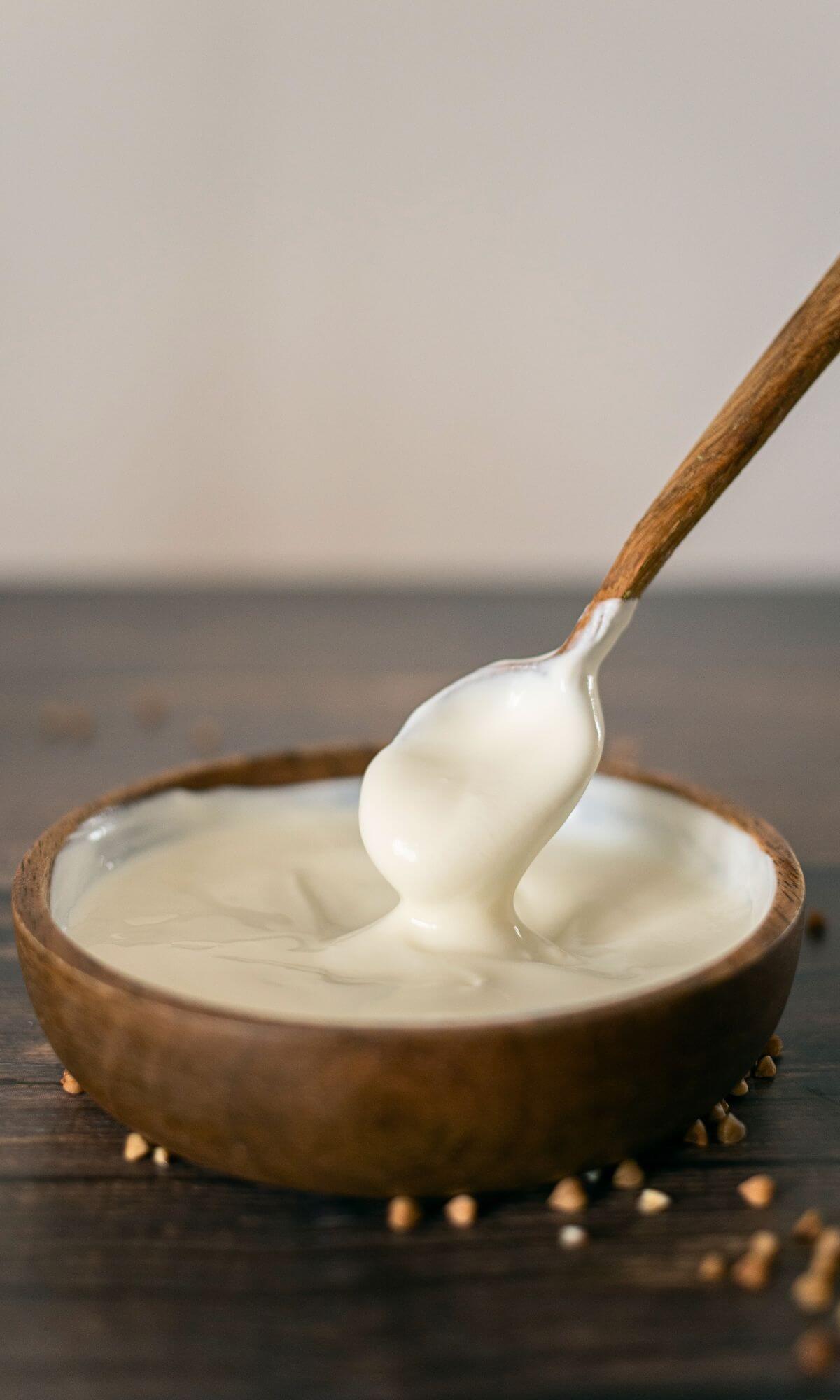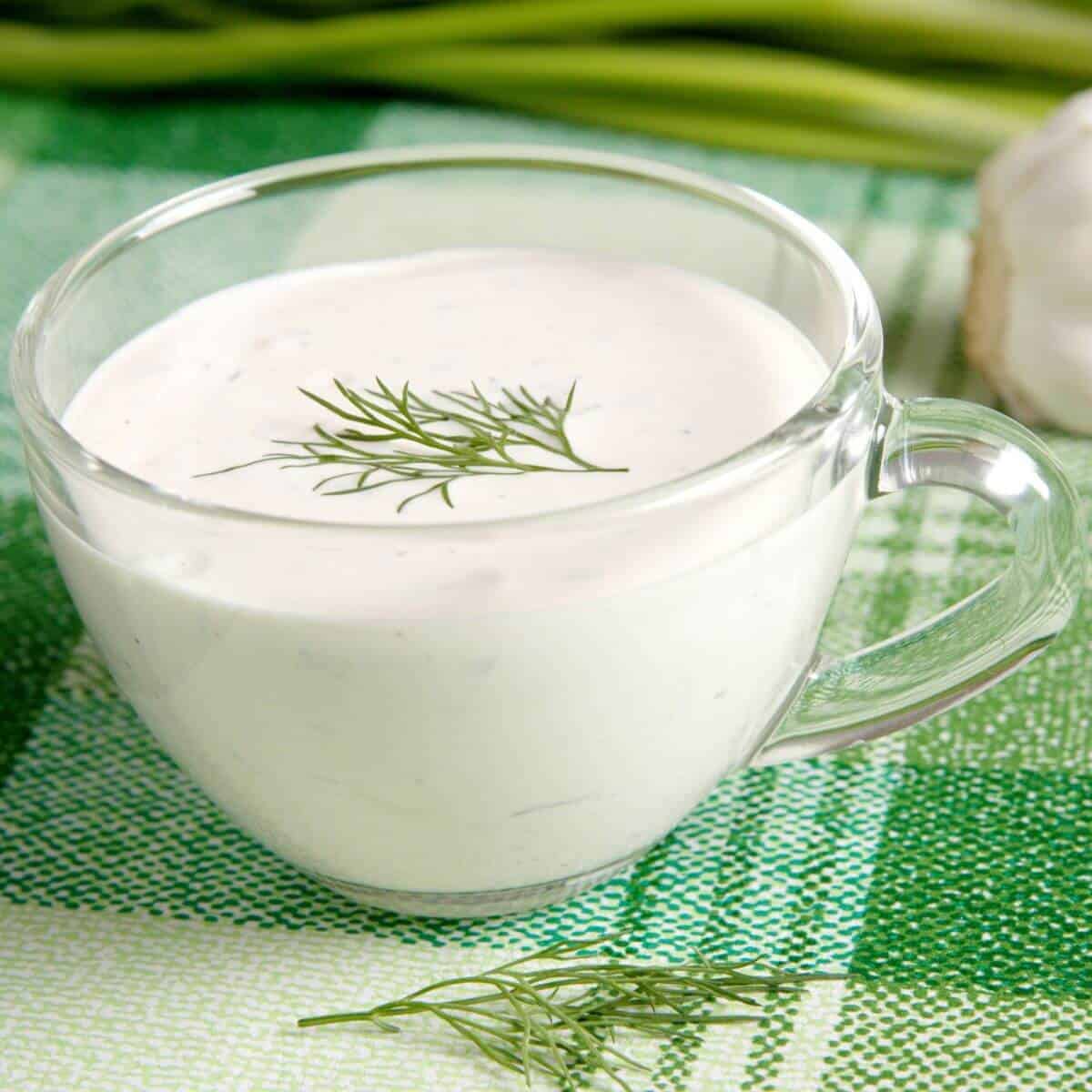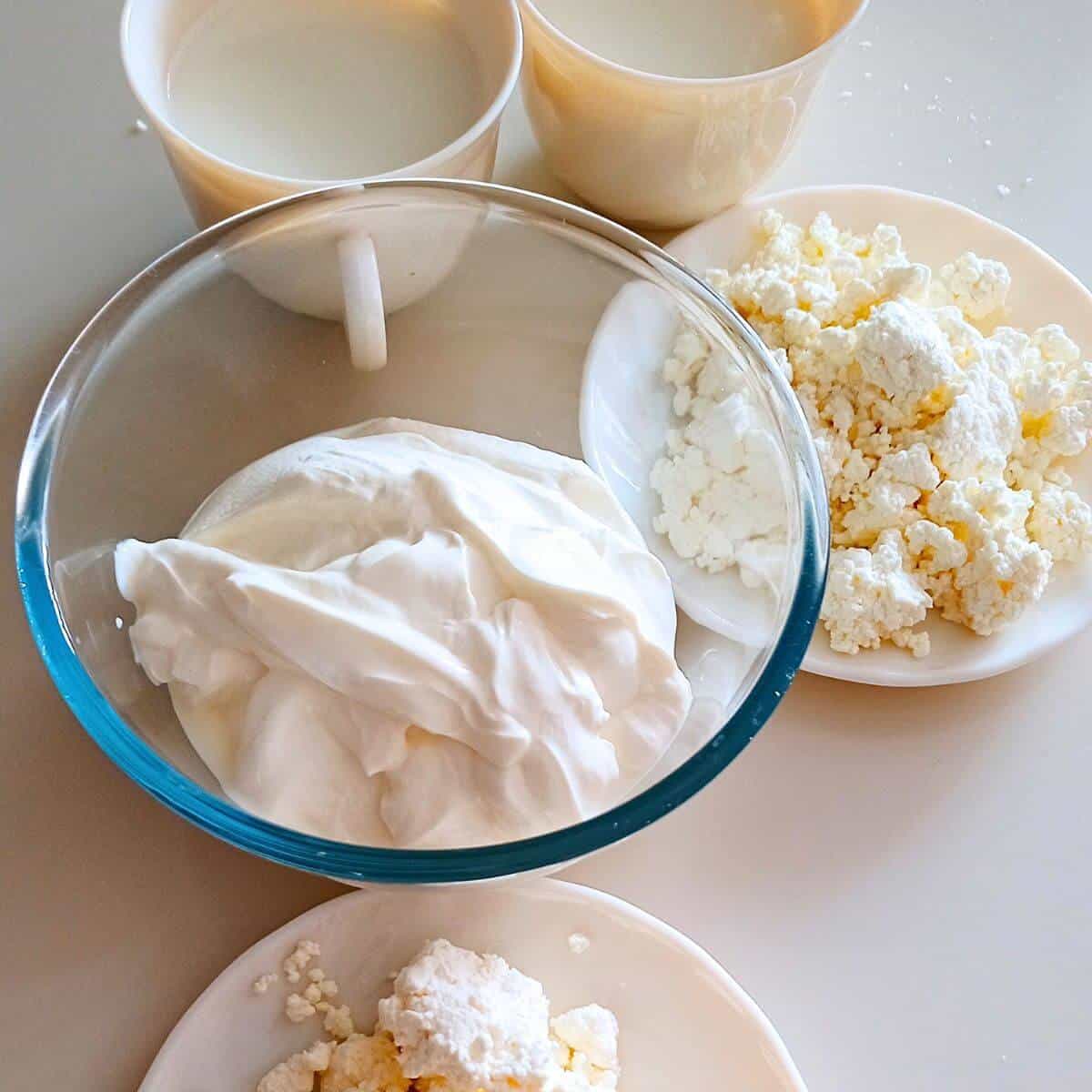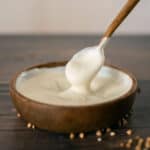| Sour cream is gluten-free, containing cream, milk, and lactic acid. Some producers add gluten via thickeners, stabilizers, flavorings, and preservatives. Cross-contamination can also occur from other items produced nearby. Always check the ingredients list to ensure that it is gluten-free. |

Many of us eat more sour cream than we realize: it's a topping for nachos, an ingredient in coffee cake, a rich addition to frosting, and a garnish on tomato soup.
Sour cream is a dairy product, but does that make it safe for people with gluten intolerance or celiac disease?
Jump to:
Sour cream is a fantastic addition to a gluten-free diet, as it's high in protein, and the tangy flavor enriches any dish, be it potatoes, sauces, or dips. Several brands of sour cream and vegan sour cream alternatives contain no gluten, so they are safe to eat. Let's take an in-depth look at sour cream.
Is Sour Cream Gluten-Free?
Like all dairy products, sour cream is naturally gluten-free because it is made from cream, milk, and lactic acid.
Pure sour cream is therefore safe for people with gluten intolerances, allergies, and celiac disease and can form part of a healthy diet.
However, some brands of sour cream add hidden sources of gluten as thickeners, stabilizers, and flavoring.
Even if sour cream doesn't have gluten as an ingredient, remember that it can contain trace amounts of gluten if it is processed in an environment with food containing gluten.
Check out the list of gluten-free brands of sour cream below, and remember to check the ingredients label of any product you eat.
What Is Sour Cream?
Sour cream is a thick, tangy dairy product made by fermenting or souring fresh cream with lactic acid, also known as lactobacillus bacteria. During the fermentation process, the fresh cream thickens, and the acid creates the characteristic sour flavor.
You can liken sour cream's flavor to cream or cottage cheese, yogurt, crème fraiche, or marscapone – these ingredients can often substitute for one another.
This rich kitchen staple is part of American and European cuisine, adding tanginess, richness, moisture, and lightness to any dish. Sour cream is commonly used as a garnish or condiment and as an ingredient in salad dressing, dips, sauces, frosting, soups, and goulash.
Sour cream is an excellent addition to gluten-free baking, as it adds a leavening element and a moist, tender crumb to your favorite coffee cake or brownies.
While sour cream is high in saturated fat, it is also a great source of protein, calcium, vitamins B and C, magnesium, and iron.
Although most of the calories in sour cream come from fat, portion sizes are usually small. Unless you eat large amounts of this delicious topping, sour cream can form part of a healthy diet (including keto).
Take care when cooking with sour cream as it can curdle easily, so it is best added at the end of cooking and heated through to preserve the creamy texture.

What Is Sour Cream Made Of?
The only ingredients sour cream should contain are cream, milk, whey, lactic acid, and perhaps salt.
While these always form the main ingredients of sour cream, the US Food and Drug Administration (FDA) allows producers also to add the following optional ingredients to their products:
Thickeners, stabilizers, and emulsifiers improve the sour cream's texture and prevent it from splitting. Preservatives extend sour cream's shelf life.
Flavorings, such as sodium citrate, enhance the sour flavor of the cream. Natural flavorings like fruit and fruit juice are also allowed.
Rennet is a combination of enzymes that thicken and culture dairy products. Rennet derives from plant and animal sources.
Sweeteners are used in flavored sour cream and sour cream dips.
Sour cream can, therefore, have plenty of gluten ingredients that you need to avoid.
The number of additives increases in sour-cream dips, which tend to contain gluten.
Although it won't be present in large amounts, even trace amounts of gluten can be dangerous.
Here are a couple of examples of gluten-containing additives:
Starch, modified starch, and dextrin are thickeners and stabilizers that contain gluten.
Flavorings, including malt or malt extract, have gluten in them as they are made from barley and often contain wheat as a filler.
Hydrogenized wheat protein is a flavoring that contains gluten.
Ingredients labels should indicate these ingredients and note that the product is unsuitable for those avoiding gluten.
Is Sour Cream Dairy-Free?
Sour cream is not dairy-free as it is a dairy product containing cow's milk and cream.
Avoid sour cream if you have a dairy or lactose intolerance or allergy.
Is Sour Cream Vegan?
Sour cream is not vegan because it is a product of animal origin, made of cow's milk and cream, both dairy products.
Vegans should avoid sour cream.
However, there are several plant-based alternatives to sour cream which your taste buds won't distinguish from sour cream. Enjoy a dairy-free dollop of one of these on your nachos.
Here are some examples of vegan sour creams, which are both dairy-free and gluten-free:
The Dairy-Free Co. Dollop Lama Cashew Topping has only three ingredients: cashews, water, and culture made from quinoa.
Forager Project Organic Dairy-Free Sour Cream is soy-free and contains organic cashew and coconut milk. Natural flavorings include salt, while thickeners are tapioca starch, pectin, locust bean gum, and agar.
The culturing acids are vinegar, lactic acid, and live active cultures. The only other additive is tricalcium phosphate to prevent caking.
Kite Hill Sour Cream is almond-based and includes water, coconut oil and milk, rice flour, chickpea protein, salt, and cultures.
The only additive is maltodextrin, a highly-processed thickener that does not contain gluten.
Toffutti's dairy-free sour cream is based on soy milk and guaranteed as both dairy and gluten-free.

What Brands Of Sour Cream Are Gluten-Free?
Apart from the dairy-free varieties of sour cream listed above, many regular sour cream brands are gluten-free, so that you can top your burrito with no worries. Here are the most popular brands of gluten-free sour cream:
- Cabot's sour cream is both gluten-free and produced in a gluten-free environment.
- Clover confirms that they produce only gluten-free sour cream.
- Touted as America's favorite sour cream, Daisy produces gluten-free sour cream with no additives and preservatives.
Darigold's original sour cream and Mexican-style sour cream are both gluten-free. - Friendship Dairies verify that all their products, including sour cream, are gluten-free.
- Horizon Organics confirms that their sour cream is suitable for those who can't eat gluten but adds the proviso that severely allergic people should check with their doctors first.
- Kemps sour cream is gluten-free – the good news is that all of their sour-cream-based dips are also.
- Nancy's Organic has two organic sour cream options, both gluten-free.
- Organic Valley's sour cream contains no gluten, the only ingredients being organic pasteurized milk and cream, bacterial cultures, and vegetarian enzymes.
- Straus Family Creamery emphasizes that all their organic dairy products, including yogurt, ice cream, sour cream, butter, and milk – even flavored varieties – are gluten-free. Their production facilities are also free of any gluten-containing products, so there is no cross-contamination.
- Tillamook's sour cream and its production facility are gluten-free.
- Wegman's sour cream is completely natural, with no artificial coloring, flavoring, or preservatives. It contains cultured, pasteurized cream and milk and culturing enzymes.
Natural sour cream is gluten-free as it is only milk, cream, and bacterial cultures. However, many commercial brands add natural and artificial thickeners, flavorings, colorings, preservatives, stabilizers, and emulsifiers to sour cream, and these additives may contain gluten. Always check the ingredients label of a product before eating it.
Sour Cream FAQs
All natural sour cream is gluten-free because it only contains cream, milk, and cultures.
However, many brands of sour cream contain ingredients with gluten, especially thickeners, flavorings, colorings, and preservatives.
Choose one of the gluten-free brands of sour cream listed above. However, even when a product is labeled "gluten-free," if you have celiac disease or gluten intolerance or sensitivity, check the ingredients label to see whether the cream contains gluten or not.
Although lite sour cream should be gluten-free, it depends on the additives the producer includes, as with regular sour cream.
While sour cream is full-fat, unless otherwise labeled, light sour cream (lite) has a 30-40% lower fat content.
To make up for this loss of fat, lite sour cream often includes thickeners and stabilizers to create the usual creamy texture –these additives may well contain gluten.
Always check the nutrition label of lite sour cream before trying it. Ingredients like wheat starch and cellulose contain gluten.
Like their original sour cream, Daisy brand's lite sour cream is gluten-free. However, Friendly Farm's lite sour cream contains modified food starch, which does potentially contain gluten.
Selection Sour Cream is gluten-free as it contains the following ingredients: skim milk, cream, modified milk ingredients, modified corn starch, sodium phosphate, guar, carrageenan, locust bean gum, microbial enzyme, and bacterial culture.
More Posts Like This
- How to Reheat a Rotisserie ChickenRotisserie chicken is known for its juicy meat and crispy skin, making it a favorite for easy family meals and...
- Tips for Cooking with Coconut OilCoconut oil has become increasingly popular recently, but how do you cook with it? And is it as healthy as...
- Are Tater Tots Gluten-Free?Many of you recognize tater tots as a popular snack in the United States. However, many people who need to...
- Is Sour Cream Gluten Free?Sour cream is gluten-free, containing cream, milk, and lactic acid. Some producers add gluten via thickeners, stabilizers, flavorings, and preservatives....
- Is Gochujang Gluten Free?Not all gochujang is gluten free, but there are lots of brands that do make gluten free versions now. Traditional...






Leave a Reply